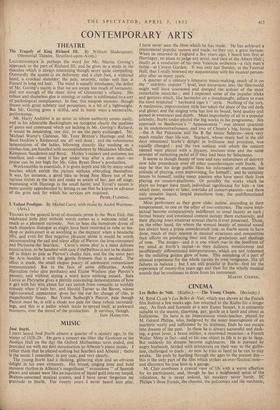MUSIC
Jose lturbi. I FIRST heard Jose Iturbi almost a quarter of a century ago, in the winter of 19287-29. He gave a concert ate ither the Grotrian or the Aeolian Hall on the day the Oxford Michaelmas term ended, and Provided me with my first introduction to Albeniz's piano music. I rather think that he played nothing but Scarlatti and Albeniz ; theirs is the music I remember, in any case; and very clearly.
The young Iturbi had a dashing, glittering style and an obviouS 'delight in his own virtuosity. His broad, singing tone and bold insistent rhythm in Albeniz's magnificent " evocations " of Spanish places and scenes were like an injection of liquid gold into my torpid, Brahms-saturated musical system, and I have never forgotten my gratitude to Iturbi. For twenty years I never heard him play. I have never seen the films which he has made. He has achieved a phenomenal popular success and made, so they say, a great fortune. When he returned to England a few years ago, I heard him first at Harringay, no place to judge any artist, and then at the Albert Hall ; finally as a conductor of his own Valencia orchestra—a rich man's foible—at Covent Garden. It was only last Sunday, at the' Festival Hall, that I really renewed my acquaintance with his musical person- ality after so many years.
A quarter of a century's intensive music-making, much of it on the " celebrity concert " level, and excursions into the film-world might well have coarsened and damped the ardour, of the most remarkable musician ; and I expected some of the popular tricks and gestures which, like barnacles on a dreadnought, adhere to even the most respected " keyboard tiger's " style. Nothing of the sort. A meditative, improvisatory style has taken the place of the old dash and glitter, and the singing tone has lost its broad, bold quality and gained in sweetness and depth. Most improbably of all in a popular celebrity, Iturbi under-played the big works in his programme. His approach to Beethoven's " Appassionata " was almost quietistic in its undemonstrativeness, and two of Chopin's big, heroic pieces —the A flat Polonaise and the B flat minor Sch'erzo—were very much smaller than life-size. Scarlatti, whose music had in the old days stimulated lturbi's delight in brilliance and precision, was equally changed ; and the two sonatas with which the concert opened were played with a dreamy, luscious tone and the same amount of sustaining pedal as-if they had been by Schumann.
It seems as though beauty of tone and easy naturalness of delivery now take precedence over all other considerations with Iturbi. It may be that his large public likes his informality of manner, his attitude of playing, even improvising for himself ; and he certainly listens to himself, unlike many pianists who have spent their lives playing on concert-platforms. Or possibly the works which he plays no longer have much individual significance for him—a fate which must, sooner or later, overtake all concert-pianists—and there only remains liquid, limpid pianoforte tone, the undifferentiated materia prima.
Most performers as they grow older incline, according to their temperament, to one or the other of two extremes. The more intel- lectual 'become comparatively indifferent to tonal beauty as such ; formal beauty and emotional content occupy them exclusively, and their playing loses whatever sensual charm it ever possessed. Those, on the other hand, for whom the sensual beauty of musical sound has always been a prime consideratioh lose, as Iturbi seems to have done, much of their interest in musical structures and concentrate their efforts on producing finer and finer gradations and shadings of tone. The danger—and it is one which was in the forefront of my mind at Iturbi's recital—is then dullness, monotonous and insufficiently differentiated interpretations, which are not redeemed by the unfailing golden glow ortone. This mistaking of a part of musical experience for the whole carries its own vengeance, like all failures in balance ; but I am still grateful to Iturbi—first for the experience of twenty-five years ago and then for the wholly musical sounds that he continues to draw from his instrument.
MARTIN COOPER.


































 Previous page
Previous page